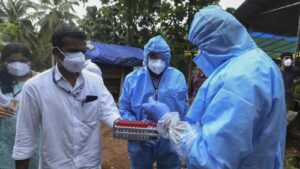ButSpeak.com
News which Matters.

A 14-year-old boy from Kerala’s Malappuram district died from cardiac arrest after testing positive for Nipah virus, prompting the state to implement strict precautionary measures.
A 14-year-old boy from Malappuram, Kerala, who tested positive for Nipah Virus, succumbed to a massive cardiac arrest on Sunday, as confirmed by state Health Minister Veena George. The boy, identified as a resident of Pandikkad, was receiving treatment in Kozhikode. Despite being on ventilator support, his condition deteriorated, and he passed away at 11:30 am after all efforts to revive him failed.
Minister George announced that the boy’s funeral would adhere to international health protocols to prevent any potential spread of the virus. The final decisions regarding the funeral will be made after discussions between the district collector and the boy’s family.
In response to this incident, precautionary measures have been ramped up to prevent a Nipah outbreak in the state. A high-level meeting was held on Saturday to strategize and implement these measures. The health minister has urged people to wear masks in public and avoid visiting patients in hospitals. A 24-hour control room with a call center has been established in Malappuram, and a three-kilometer radius around Pandikkad is under strict observation with imposed restrictions.
Additionally, the Health Department has prepared 30 isolation rooms and a six-bed ICU at Manjeri Medical College. All individuals who had contact with the infected boy have been isolated to monitor and control the situation.
Nipah virus is a zoonotic virus, meaning it can be transmitted from animals to humans, often through fruit bats or pigs. It can also spread through contaminated food or direct human-to-human contact. The virus can cause severe respiratory illness and fatal encephalitis, leading to a high fatality rate estimated between 40% and 75%. There is currently no vaccine or specific treatment for Nipah virus, making it a priority pathogen for the World Health Organization due to its epidemic potential.
As Kerala grapples with this latest health crisis, authorities continue to emphasize the importance of vigilance and adherence to safety protocols to prevent further spread of the virus.